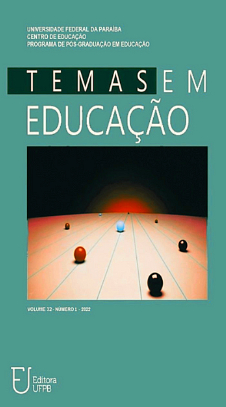MEMORY AND CULTURE IN VILA MAÚ
THE IMPORTANCE OF THE THEATRAL CORDS
DOI:
https://doi.org/10.22478/ufpb.2359-7003.2023v32n1.64467Keywords:
Theatrical Cords, Memory, CultureAbstract
This research is about the Theatrical Cords - a cultural manifestation of Vila Maú, a community belonging to Marapanim-Pará. Field research was developed, in order to obtain information about the existing Theatrical Cords in the locality and verify the importance of these theatrical representations for the older residents of the Vila, identify the most recurring themes in the Cords and elucidate the importance of this cultural representation for the conservation of local memory to the younger population. To carry out this research, we made use of bibliographical studies on Oral History, Memory and Culture, which contributed to the deepening of the theme. Thus, we anchored on the theoretical assumptions of Alberti, Aragão, Caprino; Perazzo, Meihy; Holanda, Bosi, among other essential documents. From the analysis of the interviews, we found that the Theatrical Cords have great importance in the lives of these rural subjects, since, through them, they can obtain significant knowledge for community life, as well as understand the value of the different existing knowledge. In regards to the most recurrent themes in the Theatrical Cords, we found that animal themes in general are the most constant. Furthermore, we emphasize that the valorization of this cultural expression will allow young people to enjoy a lot of knowledge inherent to Theatrical Cords.
Downloads
References
ALBÓ, X. Cultura, Interculturalidade e Inculturação. Coleção Educadores Populares. São Paulo: Edições Loyola, 2005.
ALCOFORADO, D. F. X. Boitatá – Revista do GT de Literatura Oral e Popular da ANPOLL INSS 1980 – 4504. Número especial – ago-dez de 2008. Disponível em: http://www.uel.br/revistas/uel/index.php/boitata/article/viewFile/30952/21774
BOSI, E. Memória e sociedade: lembranças de velhos. 3a ed. São Paulo: Companhia das Letras, 1994.
BRASIL. Documento Curricular do Município de Marapanim – PA, alinhado à BNCC para 2020, 2019.
CARMO, A. M. F.; NEVES, M. R. T. Marapanim Conta: um estudo das narrativas orais populares de Marapanim. 2018. 43 f. Trabalho de conclusão de curso (Monografia). Universidade Federal do Pará, Pará, 2018.
CARVALHO, L. O. R.; DUARTE, F. R.; MENEZES, A. H. N.; SOUZA, T. E. S. [et al.]. Metodologia científica: teoria e aplicação na educação à distância – Petrolina-PE, 2019. 83 p.: 20 cm. 1 Livro digital.
FREITAS, S. A. de; COSTA, M. J. da. A Identidade Social do Idoso: Memória e Cultura Popular. Revista Conexão UEPG, vol. 7, núm. 2, jul-dez, 2011, pp. 202-211. Universidade Estadual de Ponta Grossa Ponta Grossa, Brasil.
GIL, A. C. Métodos e técnicas de pesquisa social. 6. ed. - São Paulo: Atlas, 2008.
MEIHY, J. C. e HOLANDA, F. História oral – como fazer, como pensar. São Paulo: Contexto, 2019.
OLIVEIRA, H. T. Educação ambiental para a conservação para a biodiversidade: animais de topo de cadeia [livro eletrônico]. São Carlos, SP: Diagrama Editorial, 2016. 200 p. :pdf. Disponível em: https://www.academia.edu/32926038/educa%c3%87%c3%83o_ambiental_para_a_conserva%c3%87%c3%83o_da_biodiversidade_animais_de_topo_de_cadeia
Downloads
Published
How to Cite
Issue
Section
License
Copyright (c) 2023 Revista Temas em Educação

This work is licensed under a Creative Commons Attribution 4.0 International License.
Authors who publish in this journal agree to the following terms:
. Authors retain the copyright and grant the journal the right to first publication, with the work simultaneously licensed under the Licença Creative Commons Attribution that allows the sharing of the work with acknowledgment of authorship and initial publication in this magazine. . Authors are authorized to assume additional contracts separately, for non-exclusive distribution of the version of the work published in this journal (eg, publishing in institutional repository or as a book chapter), with acknowledgment of authorship and initial publication in this journal.
. Authors are permitted and encouraged to publish and distribute their work online (eg in institutional repositories or on their personal page) at any point before or during the editorial process, as this can generate productive changes, as well as increase impact and citation of the published work (See O Efeito do Acesso Livre).



















